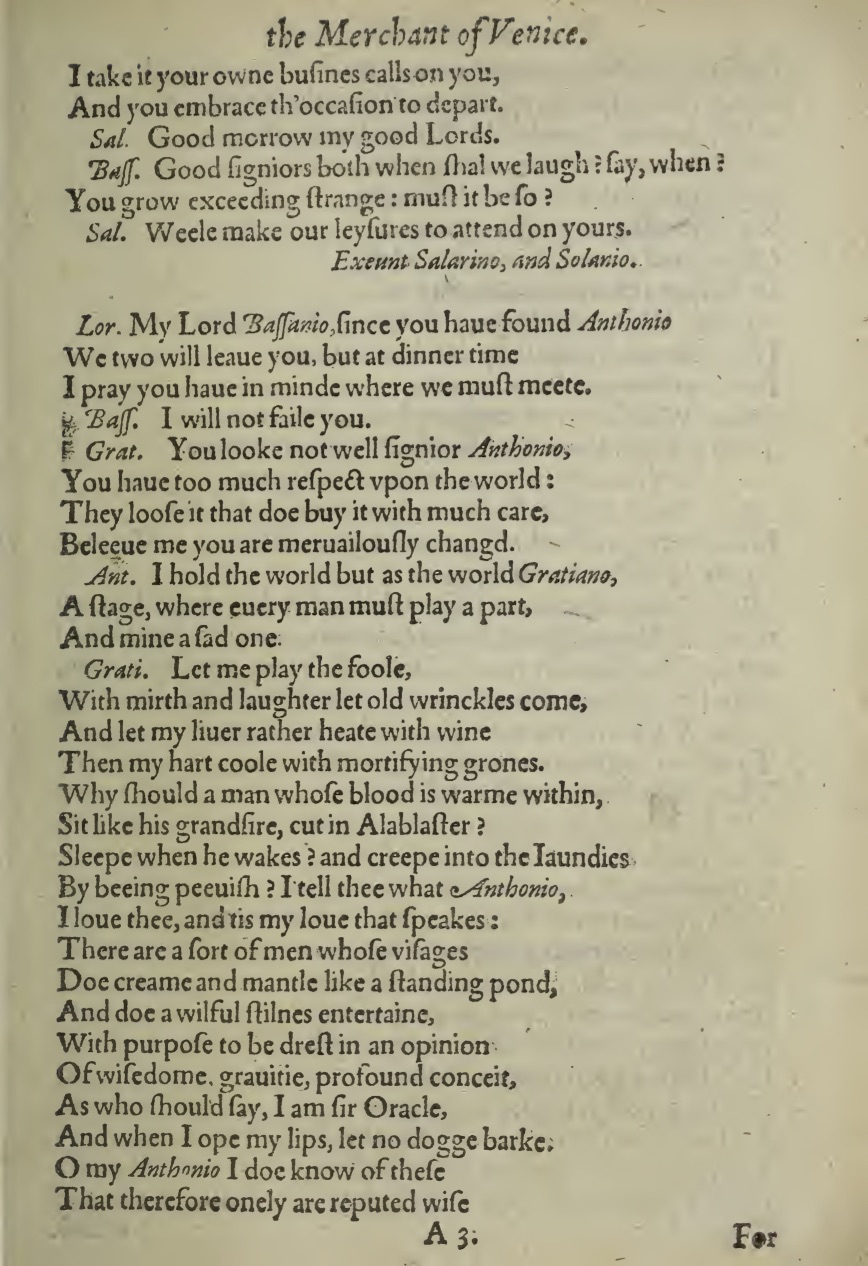- Laughter, a joyful act associated with young age, is a bodily action that goes along with the Sanguine humor. The Sanguine humor, having air as its element, sees the positive intake of air through laughter. Being the youngest of the four humors, it is the most optimistic. (https://www.nlm.nih.gov/exhibition/shakespeare/fourhumors.html)
- To grow strange, or reserved, is associated with the Melancholic humor. The Melancholic humor is the eldest of the four humors, having an affiliation with old age and negativity/pessimism.
- The brain/mind is the organ of the Phlegmatic humor, being seen as the humor for those who have aged to maturity. In this regard, Lorenzo is stating that he hopes Bassanio has been responsible and has a plan for the meeting.
- Bringing up the health and wellness of Antonio is a signal to the audience for the theme of the four humors. The four humors are based on the humoral theory, developed in classical Greece and later used by both the Romans and Renaissance Europe. The Greek physician Galen developed the idea of keeping these humors, which were based on the four elements of Air (Sanguine), Fire (Choleric), Water (Phlegmatic), and Earth (Melancholic), which were seen as fundamental and meant to be kept in balance. Saying Antonio was ‘not well’ implied the imbalance of his humors. (https://shakespeareandbeyond.folger.edu/2015/12/04/the-four-humors-eating-in-the-renaissance/)
- Referring to anxiety about Antonio’s ships being out of port. Anxiety was attributed to the Melancholic humor which pinpointed the more introspective and sentimental traits of humans.
- Antonio saying that his part in the world is to be a sad one is a clear allusion to the Melancholic humor. Because humoral theory was dominant throughout the Renaissance, it is something the audience would be familiar with. The dominance of one humor in particular was seen as creating the personality type of an individual. With Antonio’s declaration, he characterizes himself as having a Melancholic personality. Being melancholic, he is seen as someone who is dry and cold, and has a pessimistic outlook. (http://www.kheper.net/topics/typology/four_humours.html)
- Amorous and happy traits, such as mirth (amusement) and laughter are associated with the youngest humor, Sanguine. Old age and the bodily traits that come with it, being sallow, thin, and wrinkled, by contrast, are notes of the Melancholic humor.
- The liver was considered the seat of the human soul and passion. The liver was considered to produce blood in the human body and contribute to a reddish complexion, which was thought to induce the rosacea resulting from the consumption of alcohol. The Sanguine humor, with blood being its representative bodily fluid, is being invoked. Once again, Graziano’s belief of having a youthful and optimistic attitude is contrasted against Antonio’s melancholic despair. This contrast is representative of the concept of diet in Shakespeare’s time, being that in order to resolve an imbalance of humors you must consume a diet of the opposite humors. In this case, Graziano is attempting to solve Antonio’s melancholy by convincing him to take Sanguine actions (such as drinking wine), which in theory will restore his humors to balance. (https://shakespeareandbeyond.folger.edu/2015/12/04/the-four-humors-eating-in-the-renaissance/)
- Groans were believed to drain blood from the heart and blood was synonymous with hotness in the body. For blood to drain out of the heart would make it grow cold. The heart was also known to be the organ associated with the Sanguine humor. Coldness, on the other hand, was associated with the older humors. Taking both of these lines into consideration, Graziano wants to live passionately, allowing his blood to run warm rather than to groan and let it make him frigid. In this regard, he is implying that Antonio is hastening his aging through his melancholic attitude.
- Being warm blooded was associated with youth and the Sanguine humor.
- Grandsire (grandfather) is meant to denote old age. Cut in alabaster is to be cut in white stone, immobile or unchanging. Here, old age is connected with the pale statue in Alabaster. The Melancholic humor was marked by rigidity found in old age, and paleness comes from a lack of blood flow.
- Irritability was thought to produce a yellow bile, controlled by the Choleric humor.
- The heart was controlled by the Sanguine humor. This declaration is again supposed to prove Graziano’s youthful attitude.
- “Cream and mantle” is used to express that the man has taken on a fixed expression. To use the image of a standing pool growing a scum combines the elements related to the Phlegmatic humor: water (pool), phlegm (cream and mantle), and the brain (visage).
- Continuing the image of being stagnant as a passive, tempered, controlled demeanor denoted the Phlegmatic humor.
- Also contributes to the level-headed description of the man displaying symptoms of the Phlegmatic.
